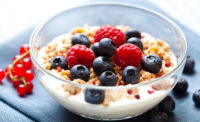It seems that U.S. consumers have cultured a love of yogurt drinks, as the latest research from Mintel, Chicago, reveals that sales of yogurt drinks have grown a healthy 62% in the five years (2011-2016). Yogurt drinks include refrigerated yogurt products in a liquid, drinkable form, and may include fruit or fruit flavoring such as yogurt “smoothies,” kefir, lassi, etc.
A relative newcomer to the yogurt sector, yogurt drinks are a standout in the yogurt market. Indeed, between 2011 and 2016, dollar sales of yogurt drinks have grown 62% to reach $893 million. Volume sales at MULO (multi-outlet) rose 73% to 407 million pints. Sales of drinkable yogurt are expected to grow 11% in 2016, making this the second straight year of double-digit gains.
Despite strong gains for yogurt drinks, the spoonable yogurt segment continues to account for the majority of sector sales. Valued at $8.2 billion in 2016, spoonable yogurt represents 90% of all yogurt and yogurt drink sales, and is expected to continue steady growth moving forward to reach $10 billion by 2021.
In terms of overall sales, the market for yogurt and yogurt drinks is forecast to grow 3% in 2016 to reach $9.1 billion, with total sales expected to reach $11.4 billion in 2021. Today, some 66% of U.S. adults purchase spoonable yogurt, while three in 10 (30%) purchase yogurt drinks.
“While boom times ushered in by the novelty of Greek yogurt are fading, the yogurt category’s draw of convenient health and the recent expansion of flavors and formats helps retain interest and preserve participation in the market. Yogurt drinks are becoming increasingly popular among U.S. consumers, and as adoption of the yogurt drinks segment grows, so too does innovation. It’s one of the few food and drink spaces where launch activity sees brand new products outpacing simple variations on form,” says Beth Bloom, senior analyst, U.S. food and drink.
Yogurt is among America’s Top 5 breakfast items, according to the report, with just under half (45%) of U.S. consumers purchasing yogurt at retail for breakfast; however, cereal (65%), fruit (55%), bread (55%) and breakfast meals (48%) take top billing.
When it comes to eating occasions, 93% of yogurt/yogurt drinks are consumed for breakfast. But, the market appears to be gaining ground in the snacking arena. More than nine in 10 (93%) yogurt/yogurt drink users say that they consume these products as a snack. Mintel research reveals that more consumers are choosing yogurt as a snack today than in previous years, as 84% choose yogurt as a morning or afternoon snack (respectively), up from 37% who chose it as a morning snack and 41% who snacked in the afternoon in 2014.
“A growing acceptance of yogurt as a snack creates huge opportunity for the market considering the importance of snacking in U.S. diets. As a result, we’re seeing product innovation expand to include formats that fit non-breakfast occasions, including savory and satiating varieties,” adds Bloom.
Well-being is a major driver for many U.S. yogurt consumers, with more than two in five (43%) buying yogurt for digestive health. Meanwhile, almost one quarter (23%) of users buy yogurt for weight loss, and calcium ticks the box for 43% of female yogurt consumers compared to 37% of consumers overall. However, Mintel research indicates that full-fat options are popular among Millennials, as they are the most likely (22%) demographic to purchased whole-fat yogurt/yogurt drinks (compared to 16% overall).
“Full-fat varieties are seeing strong sales growth at natural channels, while non-fat options struggle, pointing to a growing acceptance of fat in food. As consumers appear increasingly interested in functional benefits from their food and drinks, communicating how yogurt and yogurt drinks can contribute to these health needs will be a means of standing apart from the crowd,” says Bloom.






